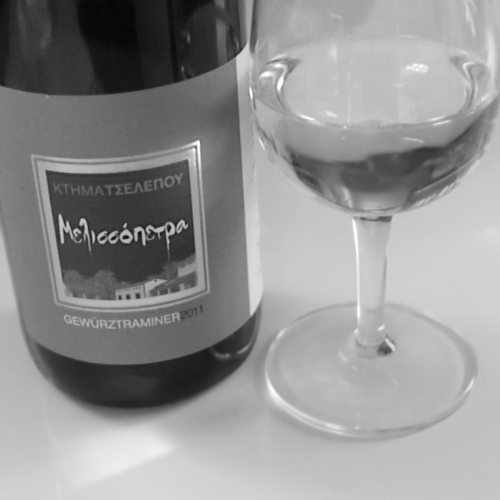Greece offers a number of intriguing indigenous grape varieties, some dating back to ancient times. The truth is however that they form only part of the modern vine growing traditions in Greece. The often overlooked international varieties sometimes manage to offer just the unexpected. One variety that few wine lovers would suspect to be grown here is Gewurztraminer. Given that Greece is widely known for its typical Mediterranean climate, this might at first glance seem counterintuitive. The following quote is from the excellent book “Wine Grapes” by Jancis Robinson, Julia Harding and José Vouillamoz: “Gewürztraminers attain higher alcohol levels than most white wines, with over 14% being by no means uncommon, and acidities can correspondingly be precariously low. Because of this the variety is not suited to very warm climates.”
Greek Gewurztraminers do not quite seem to fit into this picture. The wines are likely to show more reserved alcohol levels of 12.5 to 13% and manage to combine this with a refreshing acidity. The key is the planting of this variety at high altitude vineyards that exhibit a cool climate, especially in the late afternoons, evenings and nights, while benefitting from the hotter prevailing conditions during daytime. It is this unique combination of hot days and cool nights which leads to an earlier flavour development of the grapes, while retaining acids, when compared to the cooler growing regions abroad.
Gewurztraminer is a rather rare variety in Greece, with only a handful of wineries producing dry, varietal wines. Avantis (Island of Evia), Dio Filoi (Kozani), Lalikou (Kavala), Samartzi Estate (Viotia) and Tselepos (Arcadia) are the only ones I am aware of. Katogi Averoff also offers a varietal wine, but from the less aromatic Traminer clone. Both Boutari and Kir Yianni add Gewurztraminer as a blend; and Alpha Estate (adding a touch of Malagousia) and the Semeli Winery produce delightful sweet versions.
The most widely distributed Greek Gewurztraminer is perhaps also the finest example. The Tselepos “Melissopetra” comes from a 4.5 ha vineyard that lies at an altitude of 750 metres (2460 feet) right at the edge of the Mantinia plateau in the Peloponnese. The first vines were planted in 1992, with further expansions in 1998 and 2000. The wines name, Melissopetra, means “bee-stones”: The slate present at this vineyard site is markedly warmer than limestone and attracts the bees. This extra warmth gives the wine an edge, as the ripeness of the grapes is fully reflected.
Tselepos Melissopetra 2011, 13% alcohol: Aromas of exotic fruits and rose petals. This Gewurztraminer is very expressive on the palate, with a lively acidity and almost explosive fruit on the mid palate, followed by a long finish. Sipping this makes one long for another glass. The acidity emphasizes the remarkable aromatic power of the wine. Elegant, yet focused.
Gewurztraminer is more than “just another international grape variety” grown in Greece. These wines are distinctive, and offer much pleasure for the curious minded.


Wow, I have to try to find some of this wine. Thanks, Markus!
Marc, this should be available in NYC or NJ, if you can’t find it, I will bring you a bottle on my next visit.
We love this wine and have compared it to any gewurztraminers we could get our hands on from anywhere in the Alsatian mountains, France or Germany. None compare to this one. Enjoy.
Have only ever enjoyed the delights of the Melissopetra and the Katogi Averoff Traminer. Quite like the thought of trying to track down the other examples!
Hi Markus,
Happy New Year!!
Another great article.
Living here in the UK it is very frustrating that many of the wines you write about are just not readily available.
Paul, I hope you do! Elia, Happy New Year. It is a shame that so few Greek wines are offered in the UK market, a fact I am well aware of. I’d like nothing more than to see this changed. Sadly the official bodies from the Greek wine industry seem to focus elsewhere.